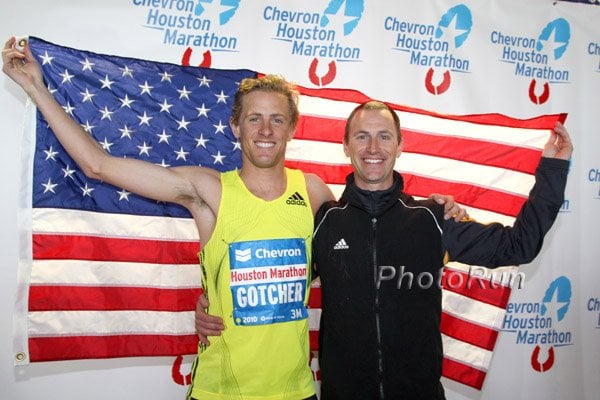Training Talk With Brett Gotcher and Greg McMillan: Highlights from LetsRun.com's 90 Minute Live Show
By LetsRun.com
January 28, 2010
On Wednesday night (January 27, 2010), LetsRun.com broadcast the third edition of Training Talk. The featured guests were American marathoner Brett Gotcher and his coach Greg McMillan.
Gotcher of course just ran the 4th-fastest US debut marathon in US history (2:10:36) on January 17th in Houston. But that race really was just the end of an amazing 53 week period for Brett. Going into the 2009 Houston race, Gotcher was just your run-of-the-mill, pretty good post-collegiate who noone knows as he had PBs of 13:56 (5k), 28:27 (10k), and 64:08 (half-marathon). A year later, he now has a half-marathon pb of 62:09, a marathon pb of 2:10:36 plus a US 20k title to his name (58:57). Also during 2009, he represented the US twice at world championships as he earned his way onto the 2009 US cross country team as well as 2009 US half-marathon team.
Gotcher's coach, Greg McMillan, is quickly becoming known as one of the great minds in the sport today. A disciple of the great Arthur Lydiard (he was at Lydiard's side when he passed away), Greg is the coach of the McMillan elite team as well as the brains behind the training website mcmillanrunning.com.
To encourage you to listen to or download the entire show (as well as past editions of training talk) at the talkshoe website, we wanted to start providing our readers with a few highlights of the show so you can see what you missed.
We spent the first 30 minutes of the 90 minute show talking to Brett. The final hour was devoted to Mr. McMillan. We did a much better job of keeping notes during Greg's talk as we figured more people are likely to listen to the start and fade off at the end. Enjoy.
Brett on why, if he had to choose between his three coaches at Stanford - Vin Lananna, Andy Gerard and Peter Teegen, he'd chose Lananna:
"What we were doing wasn't rocket science... It was just the attitude of the team. He just made you believe."
Brett on whether he's a blue collar runner or yuppie runner:
"Unless you're Galen Rupp everyone starts off as a blue collar runner.... I like to think of myself as the blue collar guy. I'm just going to get out there and run a ton of miles and its going to pay off. We don't have any Alter-G's in the living room."
Brett on how he'd like to be viewed:
"I'd like to be with the guy who stuck with it."

"Are The Africans Beatable?" (49:50)
"We have to believe that (the African runners are beatable).
If you don’t believe that, then hang up and don’t talk anymore. You have to
believe you can do it. Brett mentioned that he is good friends with Rod Dixon
and I also am very good friends with Steve Jones. Rod ran 2:08 on New York’s
course. Steve ran 2:07:13 (in Chicago) - the wrong way. He went 61 minutes
for his first half so we know he would have gone a little faster if he had gone
62:30 his first half. So we have examples of people in the past who
have run very, very well.
"The problem is this generation of runners didn't have any role models. The 2nd generation of American runners had Bill Rogers and Frank Shorter and whole list of guys. If you look at the all-time list, there are guys you have never heard of who ran as well or better than Brett and we just don't know about them. And we need to tap into those guys. We need those guys to be heroes and role models to show that (non-African) athletes can run fast. Brett can run fast, Ryan Hall has run 2:06. Dathan (Ritzenhein), who knows what he is going to run now. It seems like he's really found his spot with Alberto (Salazar). I do believe we can fun fast. Nothing should keep us from running fast - now where that places us we don't know but the spirit of our group is we can do it."
What He Learned From Arthur Lydiard - Developing The Aerobic System Is The Key To Performance (61:30 )
"There is plenty of information to show that developing the aerobic system is
the key to ultimate performance. You have to raise your aerobic ability and
that comes from logging mileage consistently - year after year - and building
that ability to run mileage year after year. Doing long runs virtually
every week, year-round is beneficial and when athletes do that in a way that
they stay healthy and they can be consistent then, they begin to run faster
and faster.
"You can go back to Arthur Lydiard and that was really his point. How many people can run 59 seconds for 400 but they can’t break 4 minutes for the mile - so they need more endurance. So I think that has to be the foundation of everyone’s training. Luckily, a lot more coaches are going to a system where they are not afraid to run more mileage."
"What’s really interesting is we
know the amount of mileage that athletes have to run to perform well" (64:40)
"What’s really interesting is we
know the amount of mileage that athletes have to run to perform well. We
know the training that it takes to be great. The problem is we can’t do that
training yet so we have to take a step back and say I need to do this training
to get that training. But we can’t do that training yet so we are three steps
behind.
"My belief is that for our runners to be successful in the marathon, they need to be able to run between 120 and 150 miles a week. That’s what almost all of the great runners have done. We need to get them to that point and we need to be smart in how we get them there. Once they can do that, then we can step back and we can look at how can we push the pace faster, how can we get marathon-specific training going. And that’s what we’ve done with Brett – we took 2.5 years to build him where he can get into that zone and he’s just in it. We only had 5 weeks before the marathon above 120 with one week above 140 so he’s certainly getting in good volume, but I’d love to see us get in 6 or 8 weeks above 130 and average 135 or so.
"We just have to run more. You have to be smart in how you do it but you can’t be afraid of running more.
"When I was (working with) Dr. (Gabriala) Rosa, that was the time when Moses Tanui was running very well and winning a lot of races, he’d run maybe 170 miles a week on occasion. You can’t be afraid (of mileage) and the Japanese certainly aren’t."
On Why His Group Does Most Of Their Training At 7,000 Feet - "You have to get used to suffering more and that makes the race easier." (1:19 )
"What I’m really finding from the athletes is that they like training up
(at 7,000 feet) as they like the suffering. They feel like it gives them an
advantage. I know when they line up at the start line they enjoy knowing that
they suffered more. We really do a lot of training in Flagstaff (as a result).
"I’m becoming more and more convinced that it’s essential if you really want to reach the highest level, you have to spend some time at altitude. Training (in Flagstaff) is beneficial not only physiologically but also psychologically, in trying to suffering more. I know it sounds crazy but we talk a lot about suffering more. You have to get used to suffering more and that makes the race easier.
"I’m not as big of a believer in the live high/train low (theory) as a lot of people are. I really like living high and training high."
|
|
|
|
|
|
Runner's World &
Running Times

Combined Only $22
a Year
Save $87

Running & Track and Field Posters
More Nice Offers: Nike Lunar Glide Savings Super popular shoe from Nike featuring Flywire and Lunar Foam
*Nike Air Max Moto Sale $69.99 for this shoe from our partner.
